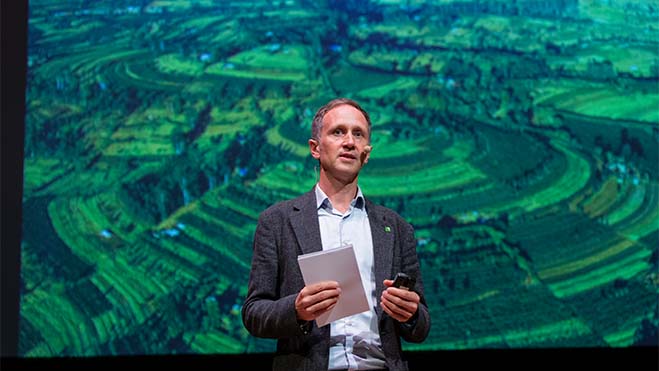





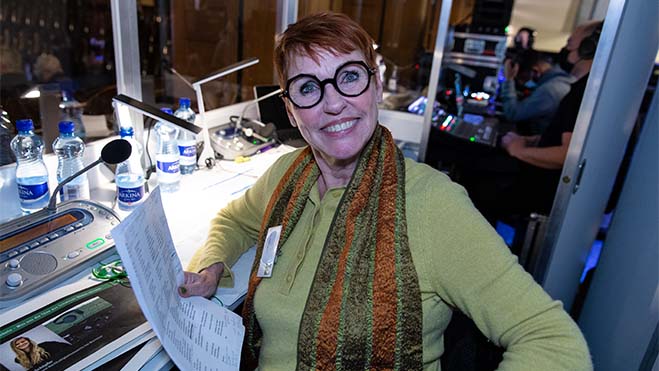
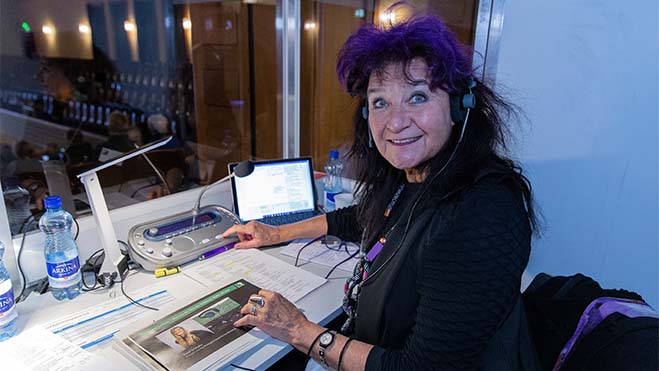
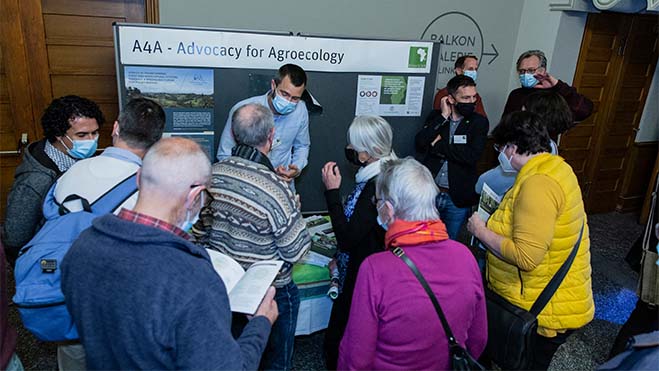

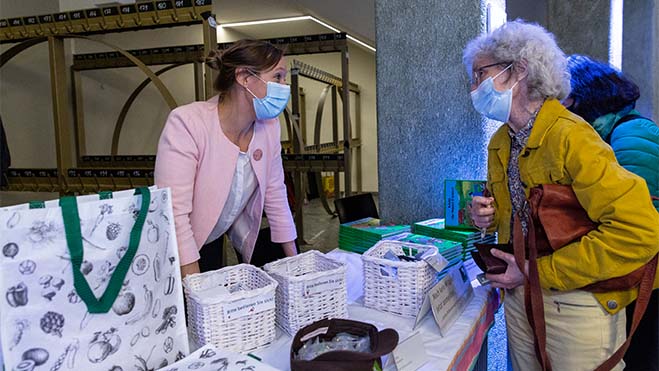
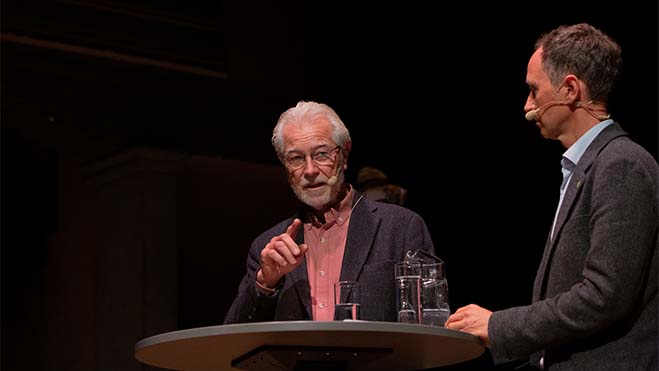

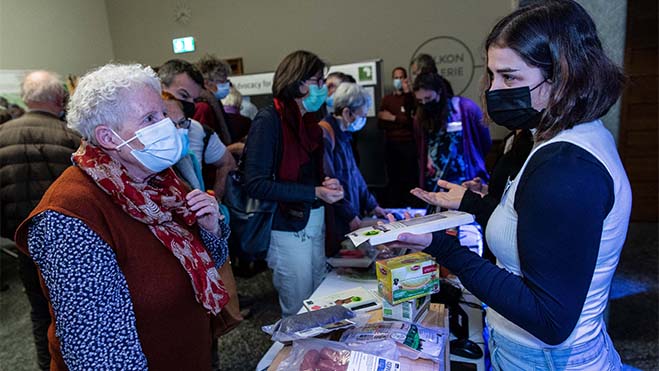
From the loudspeaker comes a squeak, a scratch, a hum, a smack. The odd sounds that interrupt Biovision CEO Frank Eyhorn’s presentation are not technical glitches. On the contrary, they demonstrate that diversity is not only seen in the landscape or tasted from your plate; you can also hear it in the soil.
Healthy soil has a sound
Anna Schöpfer, who is responsible for building awareness in Switzerland, presents Biovision’s Sounding Soil project that makes soil audible and thus tangible. Scientists are currently discovering how subterranean sounds can indicate soil health. After all, diverse sounds attest to diverse life underground, which means that soil can fulfil its functions that are essential for our survival: it provides the basis for nutrient-rich food, binding CO2, preventing erosion and much more.
Diversity in cultivation also reduces a Kenyan smallholder farmer’s dependence on a single maize or cabbage harvest, for example. Production based on different varieties creates better income and food security – especially important nowadays, as climate change has made the weather more unpredictable.
Diversity forces pests to flee
Furthermore, diversity can greatly reduce the use of synthetic chemical pesticides Pests generally have a harder time in fields with mixed crops than in monocultures. But if species are combined in a targeted way, as in the cleverly devised push-pull system for maize and millet cultivation (as Biovision programme officer Fabian Kohler impressively demonstrates), pests can be deterred while weeds are also kept at bay. Practical experience has shown that this can double or even triple crop yields – without the use of chemical pesticides.
“When I give tours of our farm, I always say, ‘Shop the way you vote!’ If people did, 40 to 50 per cent of our produce would soon be organic.”
Andreas Nussbauer, farmer at the Burgrain organic farm in Willisau, Lucerne
After all, we all depend on diversity on our plates to feed ourselves healthily. For the concluding panel discussion, Frank Eyhorn welcomed four guests who know what diversity in our food system entails. The agroecology expert stated right at the beginning: “It’s not just about promoting diversity as such. It has to be sustainable, affordable for consumers and fair for producers.”
Biovision Symposium 2021 – Part 1
Goal: sustainability as the norm
Bernhard Kammer, Head of Ecology & Sustainability Label at Migros, points out that although most customers are not well informed, “We nevertheless have to offer them – not just the conscious shoppers – a range that is sustainable, too.” Stephanie Hess, author of the Beobachter guidebook ÖKOlogisch! says she has observed that everyone actually wants to buy sustainably, but “many are frustrated and confused by so many labels, some of which are also used for greenwashing and pretending to be more sustainable than they actually are.” Additionally, sustainable nutrition is still an expensive and “elitist affair”. The goal must be “that I, a consumer, can go to the store and be sure that what I am buying is sustainable.”
“We all have to critically question our lifestyle and learn to do without, especially in our leisure time – the keyword is air travel. And we need to fill our shopping baskets sustainably; the products are available. We should eat less meat and avoid food waste.”
Bernhard Kammer, Head of Ecology and Sustainability Label at Migros
Biovision Symposium 2021 – Part 2
I am agriculture
Andreas Nussbaumer, organic farmer from Willisau, Lucerne, relies on consumers. He regularly gives guided tours of his farm, where he explains his work. He is convinced that sensitization works: “The visitors have many ‘aha’ moments.” A new agricultural museum on the farm now explores the question, ‘Who is agriculture?’ Visitors are led to the answer: everyone. After all, consumers play a decisive role in determining how and what food is produced.
“Be generous with yourself! Don’t despair if you booked another flight or bought the half-price chicken at the store. Admit to yourself that you fail once in a while and just keep going, trying the best you can.“
Stephanie Hess, journalist and author of the Beobachter guidebook ÖKOlogisch!
Stephanie Hess also does not deny that consumers carry responsibility. But in politics she sees “much greater leverage” for change: “Particularly with regard to climate change, even if every consumer does everything right it will not be enough.” Bernhard Kammer of Migros affirms that “systems that offer added value, such as Bio Suisse or Demeter” should also receive more financial support, such as by benefitting more from direct funding.
No subsidies for products that are harmful for health and the environment
Biovision President Hans R. Herren, who was interviewed by Frank Eyhorn on the topic at the end of the event, took a similar stance to the Migros sustainability manager. The World Food Prize winner calls for halting subsidies for products that fuel climate change and foods that are unhealthy because they contain pesticide residues or come from nutrient-poor soils and therefore contain hardly any nutrients.
The Biovision founder received spontaneous applause when he called for costs to be internalized – in other words, for product prices to reflect true costs, including the damage they cause. He calls wealthy Switzerland’s arguments against the pesticide initiatives that “we will have too little to eat” and “food will become more expensive” as “scandalous”.
“The issues of food choices and food waste deserve much more attention. Ask yourself: can I increase the amount of plant-based products in my diet? Could I try a vegan dish twice a week? And always keep an eye out that nothing in the fridge goes bad.”
Yvonne Lötscher, Head of Sustainable Nutrition, City of Zurich
Yvonne Lötscher, Head of Sustainable Food at the City of Zurich, showed that agricultural diversity is also possible in the city. According to her, a surprising 10 per cent of Zurich’s urban area is agriculturally utilizable, and it accommodates 20 farms. Another 5,000 allotment gardens and community gardens are in the city, plus several solidarity farming operations and that follow cocepts of agroecology. The encouraging thing, says Lötscher, is that “the number of projects is increasing, and they are becoming more and more diverse.”
At the end of the panel discussion, farmer Andreas Nussbaumer spoke up again. As a producer, it is important for him to defend himself against the argument that sustainable food is too expensive: “In Switzerland today, we spend only 6% of our income on food – a few years ago it was 20, 30 per cent. Food is not too expensive, it’s too cheap!” Again, exuberant applause. Stephanie Hess added that we have become accustomed to a meat-based diet that not everyone could afford if they switched to organic. Hence her conclusion: “For a more diverse and sustainable diet, we will have to change our lifestyle.”


